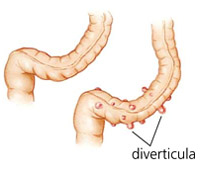 Diverticulosis is a condition of the colon, where the muscular wall allows the mucous membrane lining the large intestine to form pouches, which are then known as diverticula. They become lodging places for decaying particles of food or faecal matter after the diverticula becomes inflamed and hence, it cannot empty itself. This condition is known as Diverticulosis and it usually occurs in the middle or the later years. It is usually established by means of X-rays.
Diverticulosis is a condition of the colon, where the muscular wall allows the mucous membrane lining the large intestine to form pouches, which are then known as diverticula. They become lodging places for decaying particles of food or faecal matter after the diverticula becomes inflamed and hence, it cannot empty itself. This condition is known as Diverticulosis and it usually occurs in the middle or the later years. It is usually established by means of X-rays.
Symptoms of Diverticulosis:
The main symptoms of Diverticulosis are pain in the left lower side of the abdomen, diarrhoea or constipation or alternation of the two, and bleeding and these attacks may recur over a long time. Severe complications may arise from the tendency of obstructed diverticula to perforate and thus give rise to per colic abscess, peritonitis or fistula to bladder, vagina or other parts of the guts. Inflammatory masses may form and may result in obstructive symptoms, which closely resemble carcinoma of the colon. Such complications may however, require surgical treatment. Persons with Diverticulosis develop anaemia frequently. Stagnant food and faecal matter cause the bacteria in the diverticula, to grab all the B vitamin and folic acid from the food and prevent it from reaching the blood. The patient may also develop other intestinal and general problems due to the increase of toxins generated by this condition.
Causes of Diverticulosis:
The prime cause of Diverticulosis or diverticulitis is the low-residue diet of highly refined foods. The disease is rare in primitive tribes, who consume high-roughage diet. It is thus a deficiency disease caused by deficiency of `high-residue` foods like whole, unrefined, natural and bulky foods.Another cause of this disease is severe mental tension; due to more tension, gas is forced against the intestinal walls and hence cannot be expelled normally. This sometimes then leads to the formation of diverticula and ultimately result in diverticutosis or diverticulitis.
Treatment of Diverticulosis through Nature Cure:
Modern science in most cases prescribes surgery to remove the diverticula. But the surgical removal of old diverticula does not prevent the formation of new ones. The best way to treat the disease is through natural methods, aimed to improve digestion, decrease the formation of gases, build stronger intestinal walls to resist the formation of diverticula and relieve stress to avoid tension to build up in the body. Thus, the types of tensions are prescribed below:
Diet plays an important role in this treatment and high roughage diet consisting of sprouted seeds; nuts and whole grains, vegetables and fruits should be intaken. Cooked cereals like millet, brown rice and oats are also beneficial. Sour milk like yogurt and buttermilk, potatoes and flax seeds should be taken daily in adequate quantities. And the patient should take such small, frequent meals, rather than few large ones avoiding refined and processed foods, tea, coffee, condiments, pickles and animal foods.
Even the use of bran is considered highly beneficial in the treatment of diverticutosis or diverticulitis, however the quantity of bran to be used varies from one table spoon daily to three table spoons three times a day, depending on the severity of the disease. Most of the patients, however, need two spoons of bran three times a day, to render the stools soft and easy to pass. The patient can be increased, if necessary, after two weeks until the patient can move his bowels once or twice a day without straining. As it is difficult to eat bran dry, it may be sprinkled on cereals, or mixed with porridge, or added to soup or taken with milk or water.
Certain vegetable juices have been found beneficial in the treatment of diverticulosis. These include juices extracted from carrot, beet and green vegetables. The best fruit juices are those extracted from papaya, apple, pineapple and lemon. If the patient is over-weight, he should take a diet of natural foods aimed at reducing the weight. The use of vitamins can also help in Diverticulosis, since Vitamin E is a well-known muscle strengthener and should be used liberally by the patient. Vitamins B provide folic acid and also prevent stress and strengthen nerves.
Vitamin C can help greatly in removing toxic matter from the body. Minerals like Potassium, manganese, calcium and magnesium, all can help strengthen the muscular and nervous systems.If the disease is accompanied by constipation, then its eradication is necessary, but only through natural methods; there should be no use of any purgatives. However, if constipation occurs despite the patient adhering to the diet of natural foods, then warm water enema should be used to cleanse the bowels.




















